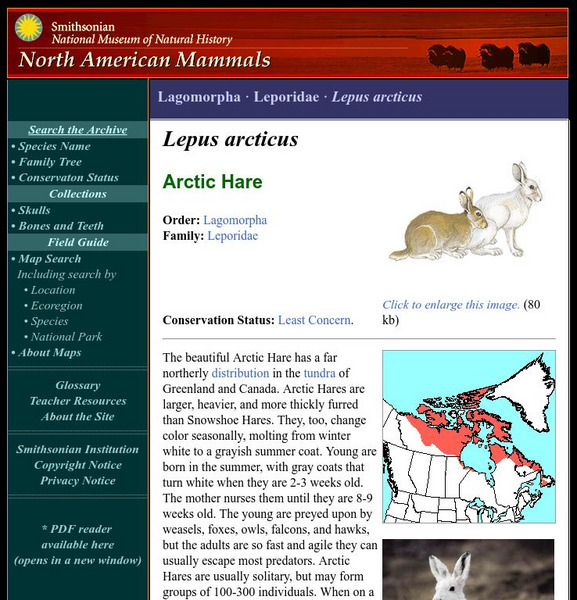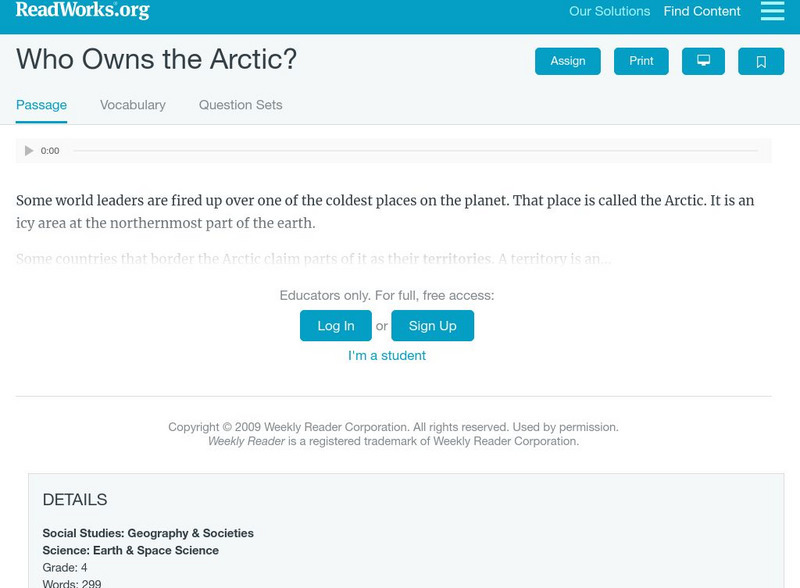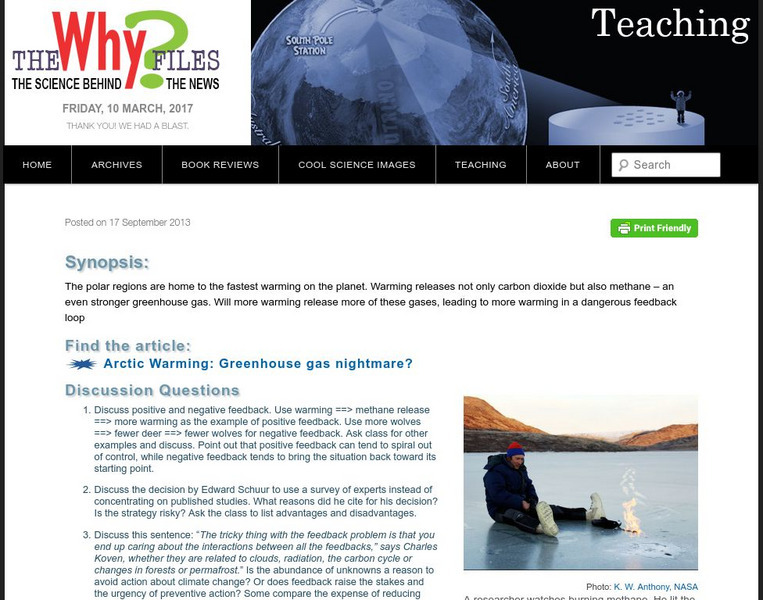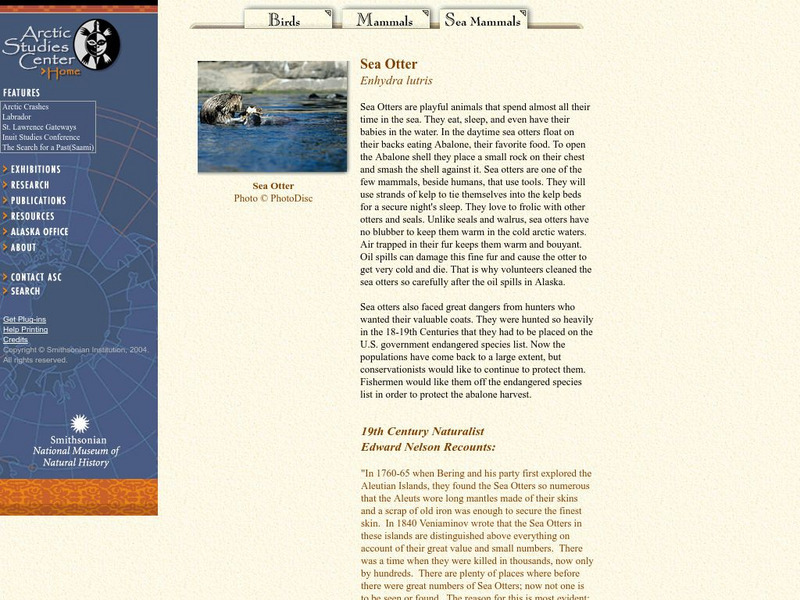Other
Canada to Fortify Arctic Sovereignty With New Icebreakers
Due to global warming, the Northwest Passage may be open for large parts of summer, therefore, allowing improved ship access. Canada is building the new Polar Class 4 Arctic offshore patrol boats to conduct sea-borne surveillance...
Smithsonian Institution
National Museum of Natural History: American Mammals: Arctic Hare
The beautiful Arctic Hare has a far northerly distribution in the tundra of Greenland and Canada. Arctic Hares are larger, heavier, and more thickly furred than Snowshoe Hares. Learn more about the Lepus arcticus, more commonly known as...
Canadian Museum of Nature
Canadian Museum of Nature: Arctic Wolf
The Arctic wolf is native to the Canadian Arctic. Information and pictures are found on this animal facts page.
Smithsonian Institution
National Museum of Natural History: American Mammals: Arctic Fox
An animal that does not begin to shiver until temperatures reach -70 C, the arctic fox is one of the most superbly cold-adapted mammals. Its dense, multi-layered coat, which is several inches thick during winter, provides excellent heat...
Smithsonian Institution
National Museum of Natural History: American Mammals: Arctic Shrew
Arctic Shrews prefer grassy clearings and marshes within coniferous forests and are never very dense in population. Mortality is high early in life. Learn more about the Sorex arcticus, more commonly known as an Arctic Shrew, in this...
Smithsonian Institution
National Museum of Natural History: American Mammals: Arctic Ground Squirrel
Arctic Ground Squirrels must cope with a harsh environment that offers long, cold winters, strong winds, a short growing season, permafrost, poor drainage, and limited cover. The squirrels are, by necessity, dormant for seven months each...
Other
Arctic Natives, Wildlife Threatened by Pollution
An article about the industrial chemicals and pesticides that are threatening life in the Arctic. Explains which species are more vulnerable to the pollutants.
Ducksters
Ducksters: Geography for Kids: The Arctic and the North Pole
Learn about the North Pole and the Arctic on this website.
Smithsonian Institution
National Museum of Natural History: Wildlife Portfolio
The Smithsonian Arctic Studies Center offers a portfolio of arctic animals. A page dedicated to each animal provides a physical description, personal observations of the animal in the wild, and several pictures.
Read Works
Read Works: Who Owns the Arctic?
[Free Registration/Login Required] An informational text about the North Pole, the countries that want to claim it, and the effects of global warming. A question sheet is available to help students build skills in reading comprehension.
Other
Natural Resources Canada: Polar Continental Shelf Project
This resource presents an overview of the Arctic - its animals, plants, people and geography.
TED Talks
Ted: Ted Ed: The Arctic vs. the Antarctic
Camille Seaman describes how enterprising people and organisms have found ways to reside around both poles despite the frigid temperatures. [4:24]
Other
Natural Resources Defense Council: Oil and the Arctic Wildlife Refuge
The continuing debate between oil drilling and wilderness preservation rages on. Questions concerning the impact to the land and animals are discussed in this site.
American Museum of Natural History
American Museum of Natural History: O Logy: Arctic Story Puzzles
Construct a story about the Inuit or the polar bear from a series of pictures that can be put together in a sequence.
Smithsonian Institution
National Museum of Natural History: Arctic Studies Center: Lemmings
This Smithsonian website has a brief, but thorough, article on the Lemmings that also includes a picture and a quote from naturalist Edward Nelson.
Smithsonian Institution
National Museum of Natural History: Arctic Studies Center: Peregrine Falcon
This Smithsonian website has a brief, but thorough, article on the Peregrine Falcon that also includes a picture.
Smithsonian Institution
National Museum of Natural History: Arctic Studies Center: Polar Bear
The Smithsonian National Museum of Natural History, in a section titled "North American Mammals," offers a general overview of the polar bear. Additional content includes detailed drawings, photographs, and a map showing the polar bear's...
University of Wisconsin
The Why Files: Arctic Warming and Greenhouse Gasses
Explore how the warming of the Earth's polar regions may lead to releasing greenhouse gasses.
Smithsonian Institution
National Museum of Natural History: Arctic Studies Center Mammals Sea Otter
This Smithsonian website has a brief, but thorough, article on the Sea Otters that also includes a picture and an extensive quote from naturalist Edward Nelson.
E-learning for Kids
E Learning for Kids: Science: Arctic Ocean: Finland: What Is Matter?
A module to learn about matter including the exploration of mass and volume.
Alabama Learning Exchange
Alex: Arctic Adventures
During this instructional activity, learners will explore plant and animal life found at the Arctic Circle. They will also learn about the dangerously cold climate and the location of the Arctic Circle relative to the school's location...
Scholastic
Scholastic: Listen and Read: Arctic Foxes: Secrets of Survival : Activity 1
Find out how Arctic foxes flourish in a land where few animals survive with an audio article that includes photos of foxes and their cubs.
Scholastic
Scholastic: Listen and Read: Arctic Foxes: Secrets of Survival : Activity 2
Find out how Arctic foxes flourish in a land where few animals survive with an audio article that includes photos of foxes and their cubs.
Schools of California Online Resources for Education
Score: Arctic Animals of Alaska (Learning Activities)
Lesson plans, pictures, activities, and links make this site valuable for the teacher. Many activities can be used for individualizing instruction.
Other popular searches
- Arctic Animals
- Arctic Food Chain
- Arctic Ocean
- Arctic Ocean Diorama
- Preschool Arctic Animals
- Arctic Plants and Animals
- Arctic Region
- Arctic Circle
- Arctic Hare
- Arctic Peoples
- Arctic Predators
- Global Climate Change Arctic





















